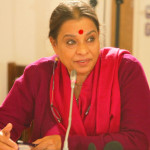India. Having discussed living and traveling in the country with my female friends at university, I realised that the views held on the country were polarised. On the one hand, it is the country that is now the rape capital of the world, home to patriarchy, and an unsafe place to visit if you are female, particularly so if you are white. On the other hand, it is the hipster dream, with its gap year opportunities, yoga, chai, Buddhism, and the Himalayas.
As someone who identifies as a feminist of colour, I have shared a particularly complex relationship with the country over the years. Yes, I do occasionally feel unsafe when I am in India. I have had men take pictures of me in markets and malls and comment on my face, body, and clothes. It is also the country that prompts my mother to check whether I’m appropriately dressed (read: covered enough) every time I leave the house, and this used to cause arguments when I was younger. I would be secretly glad that I had the West to escape back to- a place where I could be myself, assert my femininity, and not have to deal with the consequences of not labouring over how long my skirts were or just how transparent that cotton t-shirt was in the sun.
For a very long time, the West was my haven. I could go out for a run at any time of the day, travel by train, bus, and taxi without having to think things too much. Did I always feel secure? No. Once on a very empty late train in London, I had a stranger sit near me and make conversation with me through the entire journey and then follow me when I got off at my station. Luckily, I managed to hail a taxi and get home safely. And the time a man tried to look up my skirt (I was wearing opaque tights!) on the tube, or the several times during my undergraduate degree when drunk male students made sexual comments or tried to grope me. Sometimes I would get an apology the next day, either from the guy or his friends, along the lines of ‘I/He was drunk, and you know how people are when they are drunk!’ And all the times I have been dismissed by guys for the way I look: a comment such as ‘You’ll make a good trophy wife’ may have been made in jest, but it is difficult to dismiss the underlying sense of male superiority with the reduction of my existence to my gender and outward appearance.
Yet in my head, somehow this was all more ‘acceptable’, or at least easier to deal with because, on the surface at least, there is a more gender equality in the West. As a result, you dismiss such incidents, or worse, you laugh them off with friends. A male ‘friend’ who tries to feel you up or makes lewd comments when drunk is not an evil third-world country misogynist. He’s just your average guy at university under the influence of alcohol and ‘boys will be boys’. These incidents did disturb me, but I’d convince myself that these men were not as sexist or dangerous as those in India, mainly because no one around me seemed to think this was sexual harassment and something worth agonising over.
Over time, this sense of inferiority as a female extended to my work: for instance, as a graduate student, I was acutely aware of my presence as young woman of colour at academic conferences on historical linguistics, where the majority of attendees are white and male. I did on these occasions make a very conscious effort to dress in a way, so as not to bring attention to my femininity because I wanted to be taken seriously. But at the same time, I felt the same frustration I’d feel on holiday in India, when I had to choose my clothes each morning in order to be perceived a certain way.
After a particularly stressful period in my life last year, I got to spend time in India, and strangely enough, found it to be one of most liberating experiences of my life. I lived in t-shirts paired with long wrap-around skirts, the sort favoured by Burmese women, and tied up my hair. I did not wear a scrap of makeup for days on end. There is definitely less pressure to look made up all the time in India – something I used to look down upon when I was younger, but now embraced. With this focus off how I dressed and looked, I had time to read, write poetry, rest and rejuvenate. There were still men who stared or made the occasional comment, but this time around I approached everything differently. Life had shown me that misogyny is pervasive in societies worldwide, and it made me stronger and able to deal with it better. It helped me understand that India was no longer just the scary place with creepy men that I had previously dismissed; it was also a land of immense possibility that was available for me to explore and learn about.
Author: Priyanka says my long-term goal is to work in human rights, focusing on issues related to women and children in South Asia, Myanmar, and Tibet. Tweet me @ettspar
Looking forward to reading your blogs, you can mail us your entries at WriteWithUs@csrindia.org, or upload them at Write With Us.
Donation for Centre for Social Research to Join our effort in rehabilitating Domestic Violence
Discuss this article on Facebook





